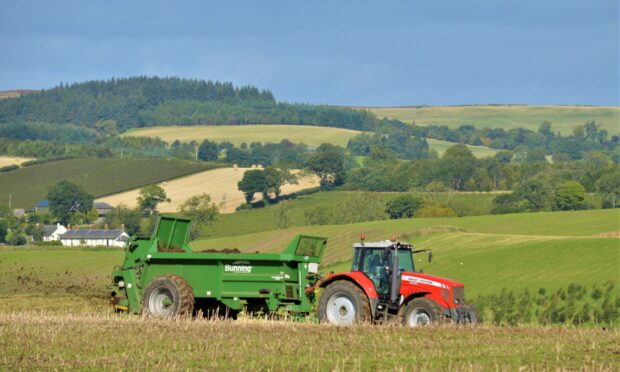Farmers growing combinable crops and potatoes have said that nutrient management planning is key to improving resilience amidst the unprecedented costs of fertiliser.
That was the unsurprising message from most of the 550 farmers and crofters who responded to NFU Scotland’s (NFUS) intentions survey which is used to provide the union’s policy teams and committees with evidence and information about farm business planning.
Farmers are applying more organic manure to their fields
The survey revealed that a very large proportion of combinable crop growing members are increasing their use of organic manures and most respondents are already reducing pesticide use or are interested in reducing pesticides.
Most combinable crop growers said they were interested in reducing tillage or are already reducing tillage.
NFUS crops policy manager David Michie, said that the responses will be used to assist with policy lobbying, political and industry engagement, and partnership working, but mainly to keep the union’s policy team right.
Looking at his specific policy area, Mr Michie said that it was evident that producers want to change or have already changed practice in their businesses to make better use of resources, bringing business, economic and environmental advantages.
“The market, supply chain, and politicians are all looking for improvements in environmental performance,” said Mr Michie.
“We now have evidence that Scottish farmers are already doing their bit for the environment and that they are interested in doing more. It is crucial that supporting policy from government is in place to move intention to action using the right incentives.”
Mr Michie said that the union was working with farmers and growers to try new approaches and address the barriers and risk associated with changing the way people farmers.
He said that the Scottish Voluntary Initiative was a key example and that the collaboration with other initiatives are also underway.
From the potato grower respondents, Mr Michie said that there were more responses from seed than ware growers and that the union was continuing to lobby for reciprocal seed potato trade with the EU.
“It came as no surprise that to improve resilience, most respondents are interested in selling into different markets and the second largest number of respondents are already selling into different markets,” he said.
NFUS is lobbying for reciprocal seed potato trade with the EU
“Seed growers who previously supplied countries in Europe have had no choice but to find alternative markets after Brexit prevented them from selling into the existing and large EU market.
Looking to the future, David said: “The next survey will be out in the end of 2023.
These results are important to sense check our positions. We must listen to everyone, not just the vocal minority. Thank you for providing us with evidence and supporting our work.”

